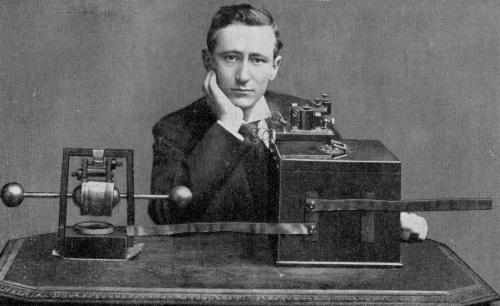Marconi Tunes in Comms Pioneers
Source: Hatti Hamlin

Guglielmo Marconi shared the 1909 Nobel Prize in Physics for his work on wireless telegraphy.
Nominations for innovators in telecommunications and the Internet close soon for the prestigious Marconi prize.
Gioia Marconi Braga, daughter of Guglielmo Marconi, the inventor of radio, wanted to honor her father, so she raised an endowment for the annual Marconi Prize. Like the Nobel Prize, it is given to a living scientist, but since no Nobel Prize specifically recognizes achievements in the field of telecommunications and the Internet, she wanted it to become that field’s pinnacle honor. She aimed to have the award recognize and highlight the ways in which telecommunications and the Internet have benefited mankind.
Gioia’s efforts to promote the prize were helped by her extraordinary connections; she moved among kings and prime ministers with ease. Once established, the award was bestowed on an extraordinary group of scientists and visionaries.
The Marconi Prize, which has been given to just 47 individuals since it was established in 1974. Arthur C. Clarke and E. Colin Cherry were among the picks in the early years, and in more recent decades, it included most of those scientists who contributed to the fundamental development of the Internet and telecommunications.
Some Marconi Fellows are household names, for example Sergey Brin and Larry Page, Bob Metcalfe and Vint Cerf. Some are virtual legends within their specific areas of research, but are best known by the public for the companies they helped create.
Irwin Jacobs’ great contribution to wireless communications was Code Division Multiple Access (CDMA) which increased wireless capacity by orders of magnitude, but he is better known as the founder of enormously successful Qualcomm. His early partner, Andrew Viterbi, created the widely used Viterbi algorithm for interference suppression, used by all four standards for international telephony. Henry Samueli’s contribution, the development and commercialization of analog and mixed signal circuits for communications systems, led to the creation of Broadcom, another giant in the industry.
Several encryption pioneers have been honored, including Whit Diffie and Marty Hellman, who created the concept of public key encryption. Ron Rivest built on that foundation to develop the most widely used public key encryption system, offered by the legendary Internet security firm, RSA.
Some Marconi Fellows are revered in academic circles but are less familiar to the public. UCLA Prof. Len Kleinrock, often called a father of the Internet, and Paul Baran, another Marconi Fellow, both contributed to the basic principles of packet switching, the technology underpinning the Internet. Stanford Professor Emeritus John Cioffi invented the DSL modem and has gone on to found several companies in the telecom space.
Several Marconi Fellows have been honored for their enormous contributions to optical fiber, including Sir David Payne, of the University of Southampton, and Andrew Chraplyvy and Bob Tkach, researchers at Alcatel-Lucent Bell Labs.
To win a Marconi Prize you must do something both brilliant and practical, with obvious benefits to mankind through the advancement of telecommunications and the Internet. You earn extra points for helping promote and/or commercialize the invention while overcoming resistance on all fronts, demonstrating entrepreneurial capabilities.
Of course you must be nominated. Self-nominations are not accepted, and several endorsers are required. In general, winners are honored for specific achievements, not a lifetime of work in the field.
Finally, you must impress the selection committee comprised of world-renowned engineers. Their standards are extremely high.
If you meet all these requirements and are chosen, you’ll receive the $100,000 prize at the annual awards gala, which takes place this year at the Royal Society in London on Oct. 20, 2015. Peter Kirstein, called the father of the European Internet, will be honored.
While nominations are accepted all year, if you want to be considered for the 2016 prize, your nomination should be submitted no later than July 31st. The 2015 Young Scholar Award deadline is even tighter, closing on June 30th. Details may be found at www.Marconisociety.org, including nomination specifications and forms. Submissions in English are preferred, but we will work with nominators if necessary.
Incidentally, in 2008, the Society added the Paul Baran Young Scholar Awards to recognize some of the world’s most promising young scientists. Since its initiation the program has given out 20 awards. Details on that award, given to a young researcher 27 or younger at the time of nomination, may be found at the web site as well.
--Hatti Hamlin is the Executive Director of The Marconi Society
| }
|